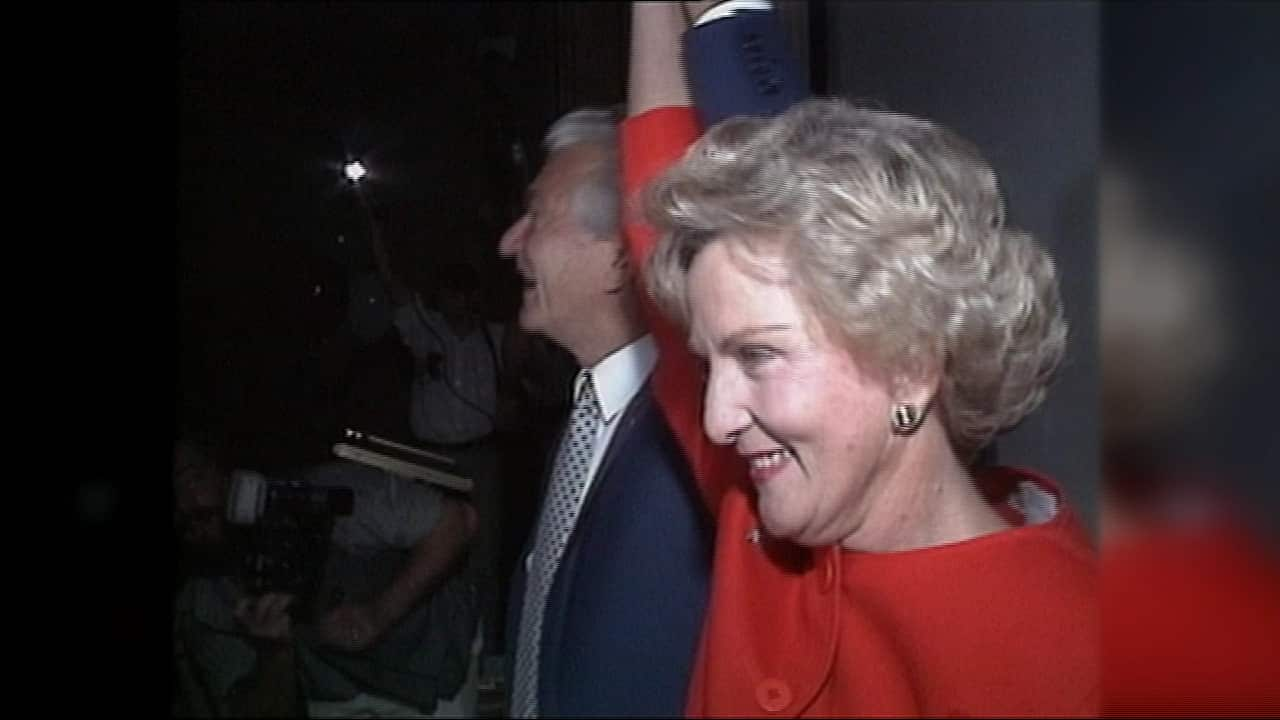In the early 1990s Yothu Yindi's song Treaty reached the Aria charts and Carmen Lawrence became Australia's first female state Premier in 1990.
The National Archives of Australia has released selected key cabinet records for the years 1990 to 1991 after a 25 year embargo.
The documents show Australia's economy in trouble, protests over the sending of troops to the Gulf War and a Labor leadership take over.
The documents also show growing concern about the rise of Islamic groups in Asia.
But it was also a golden period for Labor - an election win in 1990 saw the party enter a record fourth term continuing the government's focus on microeconomic reform and new Federalism.

Bob and Hazel Hawke, election victory, 1990.
Mr Hawke wanted to see a more simplified political process with the states abolished and replaced by a central government.
"I argued then that the states should be abolished and replaced by central government with strengthened relevant local government areas," he said.
But 25 years on Mr Hawke conceded the idea never really gained much support.
"Would you believe that politicians of both parties seem to like the idea of lots of parliamentary seats around the country on which to park their bums and were reluctant to see the disappearance of such comfortable positions," he said.
Unemployment had reached 11 per cent in 1991 and interest rates were high prompting federal Treasurer Paul Keating to warn of tough times - he said the accounts showed Australia was in a recession or as Paul Keating then described it "the recession Australia had to have". Australia's involvement in the First Gulf War marked a key transition in international security.
Australia's involvement in the First Gulf War marked a key transition in international security.

"The recession we had to have" - Paul Keating, 29 November 1990 Source: SBS News
There were concerns the move would be another repeat of the Vietnam War, prompting protests across the country.

Gulf War protests, 1990. (National Archives of Australia) Source: National Archives of Australia
And in an indication of things to come, cabinet security committee papers also revealed concerns about the growth of Islamic groups and the unpredictability of the terrorist threat facing Australia.
Professor Nicholas Brown, a historian with the Australian National University, has looked closely at the cabinet papers.
He said it was a time of both optimism and apprehension when it came to global security.
"What you're seeing a really interesting aspect of these cabinet papers is this the period of the end of the Cold War," Professor Brown said.
"And there's a sense a brief sense the world is going to be a much open freer place."
But Professor Brown said the threat posed by extremist groups was also a concern at the time.
"Security assessments are starting to observe, or quite frankly identify as the rise of Islamic groups, particularly Abu Nidal in south east Asia, that has a very different modus operandi to other terrorist groups," he said.
Mr Brown said the government of the day had no sense of the rise of Islamic fundamentalism of the kind now seen.
In migration policy there was a stronger focus on the economic contribution of migrants - but the papers also showed the need for maintaining strong links with ethnic communities.
But 25 years on Mr Hawke said the ethos of multiculturalism had changed.
"Obviously the big change has been the question of our Muslim community," he said.
"There's not doubt that members of our Islamic community in Australia are subject to greater pressures and prejudices than ever before."
Looking back at that time Mr Hawke described multiculturalism as a source of great strength for Australia.
"One of the reasons for our growth both economically and culturally and it would be a tragedy if we let anything diminish that," he said. Cabinet documents showed growing concern about so-called illegal immigration.
Cabinet documents showed growing concern about so-called illegal immigration.

Children at the first Muslim school in Perth, 1990. (National Archives of Australia) Source: National Archives of Australia
The trigger was people arriving by boat from Cambodia in the late 1980s and the large number of undocumented migrants also living in the country.
Professor Brown said this was the period that saw the government embrace mandatory detention - a policy that would be first introduced by Labor in 1992.
"You do see an increasing focus on what Australia is going to do about illegal immigrants and a move towards detention centres the first of which was established during this period," he said.
"They're not mandatory detention centres but there is an increasing awareness that the government needs to get tough on illegal immigrants."
The Royal Commission into Aboriginal Deaths in Custody was part of a wide-ranging Indigenous focus in this period.
Professor Brown said many initiatives were launched at this time.
"One of the striking things about this period is that a whole lot of factors in terms of Indigenous affairs are coming together pretty much all at once," he said.
"The Royal Commission's final report is delivered in 1991. There is the establishment of the Council of Aboriginal reconciliation."
Professor Brown said there was a sense that Aboriginal issues had a momentum in those years that could not be denied. PHOTO
PHOTO

Paul Keating, the new Australian Prime Minister, smiles at a press conference after he defeated Bob Hawke in a close vote. Source: AAP
And like 2015, 1991 saw a change in leadership - Paul Keating ousted Bob Hawke from the role to become prime minister in December 1991.









